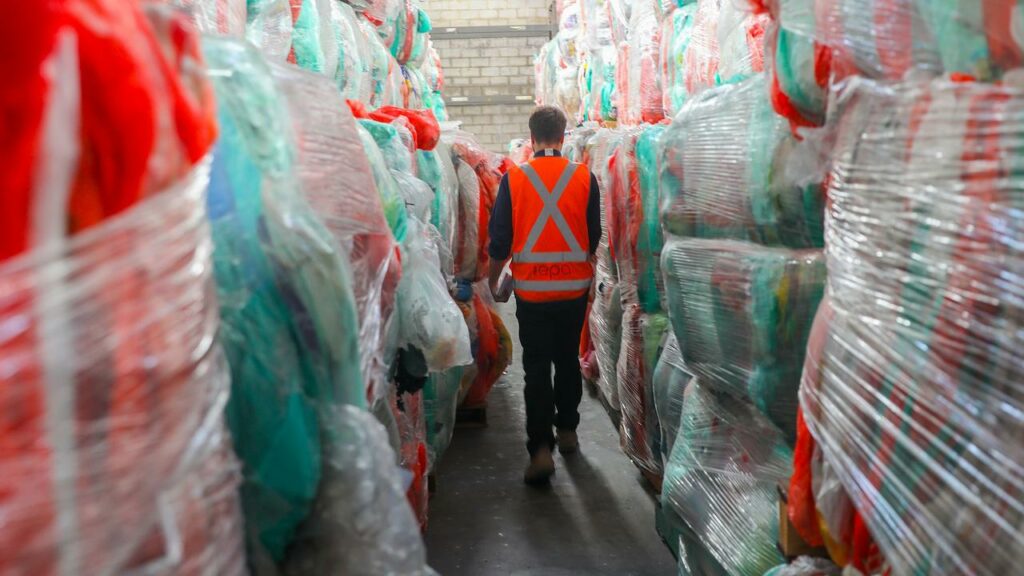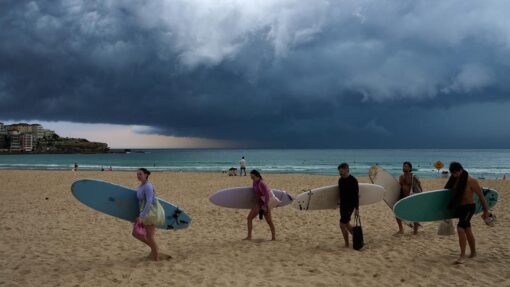Mess still unfolding after plastic recycling scandal
Tracey Ferrier |

It’s been three months since Australians discovered the soft plastics they’d dutifully returned to supermarkets for recycling had been secretly stashed in warehouses across the nation.
So far 32 stockpiles have been found in three states – 12,393 tonnes of waste consumers thought would have been turned into street furniture, fence posts and the like by now.
The latest four stashes were only identified last week, and it’s possible more are yet to be discovered.
The failure of the privately run, for-profit REDcycle scheme – Australia’s only national soft plastics recycling program – has created the mother of all messes and now there’s a battle over who should clean it up.
Should it be the self-described “team of seven mums” at REDcycle, who had stewardship of a national waste program with no apparent oversight by government?
Or should it be Coles and Woolworths, as the NSW environment watchdog has suggested?
As partners in the voluntary scheme, their supermarkets served as collection points. The grocery giants also promoted it to customers, and were responsible for generating much of the stockpiled waste.
Or could taxpayers wind up footing the bill for a clean-up likely to end in one of two ways: With it all going to landfill, or being shipped overseas for another country to deal with.
Officially there’s a third option on the table – recycling the stockpiles in Australia. But experts say there’s no capacity with domestic infrastructure and end-use markets dwarfed by the scale of the challenge.
It is an unmitigated shambles that’s been further complicated by other factors.
Firstly, state environmental watchdogs have lost patience and say the stockpiles are a threat to public safety and must be dealt with, fast.
Should they catch fire – as other highly combustible stockpiles have done in the past – plumes of highly polluted, toxic smoke could drift across major cities.
Secondly, there’s a legal bid by an aggrieved creditor to wind up RG Programs and Services Pty Ltd, the company behind the REDcycle scheme.
BTG Logistics claims it hasn’t been paid for storing 660 tonnes of plastic, and the matter will be heard in a NSW court on February 27.
That’s five days after charges against RECcycle’s parent company will be heard in court.
Those charges, brought by Victoria’s environmental watchdog, accuse the company of failing to comply with a direction to reveal the locations of its plastic stockpiles, and could see the firm hit with a $165,000 fine.
Meanwhile, Coles and Woolworths are deeply displeased with the NSW Environment Protection Authority, which last week sent them draft clean-up notices to remove more than 5200 tonnes of plastic from 15 sites.
The authority’s Tony Chappel told the retailers they had a “responsibility” to address the stockpiled waste and while it was unfortunate the plastic may end up in landfill, protective action was necessary.
Coles and Woolworths will be examining the boundaries of their liability, as national collectors for the scheme, as the watchdog insists they have both a moral and a legal responsibility.
There are also questions about why the grocery chains should be left holding the bag for a scheme that gathered soft plastics from many other REDcycle partners including Kmart, Australia Post and Fantastic Furniture.
Coles and Woolworths insist they didn’t know REDcycle was stockpiling plastic, let alone where.
Smack bang in the centre of the drama is Liz Kasell, who founded REDcycle in 2011 after feeling terrible about the amount of soft plastic waste going in her bin, bound for landfill.
The chief executive of the scheme – who’s also the director and sole shareholder of RG Programs and Services – has publicly said it’s merely paused, and work is progressing on a reboot.
She’s also said the stockpiling was not a cover up, rather an attempt to ride out problems including a 350 per cent jump in the volume of returned plastics during the pandemic, the loss of its largest taker of returned plastics due to a fire, and a lack of processing capacity.
Ms Kasell declined AAP’s requests for an interview and did not answer questions relating to the wind-up application, including what debts and assets REDCycle and her company RG Programs and Services had.
But she did issue a statement saying “high value downstream processing solutions are emerging” and REDcycle was continuing to work on a solution.
One keen observer is veteran campaigner Jeff Angel, who leads the Boomerang Alliance, representing 55 of Australia’s leading community and environment groups.
He says Australians are witnessing what can happen when solutions to the waste crisis are left to voluntary schemes, however well meaning.
“This is what happens when the packaging and supermarket sectors use a small recovery scheme to pretend the soft plastics problem is being solved.”
But it’s not, with REDcycle and other much smaller schemes recovering just 4 per cent of the soft plastics Australia generates.
“The fundamental problem is the lack of a market to support an ongoing effort and this can only be fixed by mandatory recycled content rules, which to date have been opposed by industry and government.”
Jennifer Macklin is a researcher at Monash University’s Sustainable Development Institute and says there are two big stories flowing from the REDcycle’s failure.
“One is what REDcycle was doing, and why this happened,” she says.
“And then there’s the bigger story – why was REDcycle, set up by one woman, a mum who hated the amount of soft plastics in her bin, responsible for recycling the nation’s consumer soft plastics?”
She says REDcycle’s predicament is associated with governance issues, including Australia’s aversion to approaches that get big results, quickly.
“What you see overseas is direct intervention by government, regulations, mandatory requirements in Europe, particularly, also in some states in America and in a number of Asian countries.
“Australia does not typically do that. And so the government is taking the supportive, collaborative approach and we’re seeing how slowly that transforms things, and how many issues arise.”
Mr Angel agrees.
“The former federal government and the supermarket sector were happy with the green impression they were giving. And they didn’t want to ask questions,” he says.
“The supermarkets say ‘Oh we didn’t know what was happening with REDcycle. Well they didn’t go and check and they certainly didn’t commit to using the material that was being collected.”
Coles, Woolworths and Aldi are part of task force, formed in the wake of the REDcycle drama, to come up with soft plastics solutions.
Mr Angel hopes the relatively new Labor government will step in if decent solutions don’t materialise.
“I had a letter from (environment minister) Tanya Plibersek a day or so ago. She says she’s not going to hesitate to regulate on soft plastics if they don’t come up with an effective answer,” he says.
“So maybe there ‘s a change at the federal level to act.”
AAP


